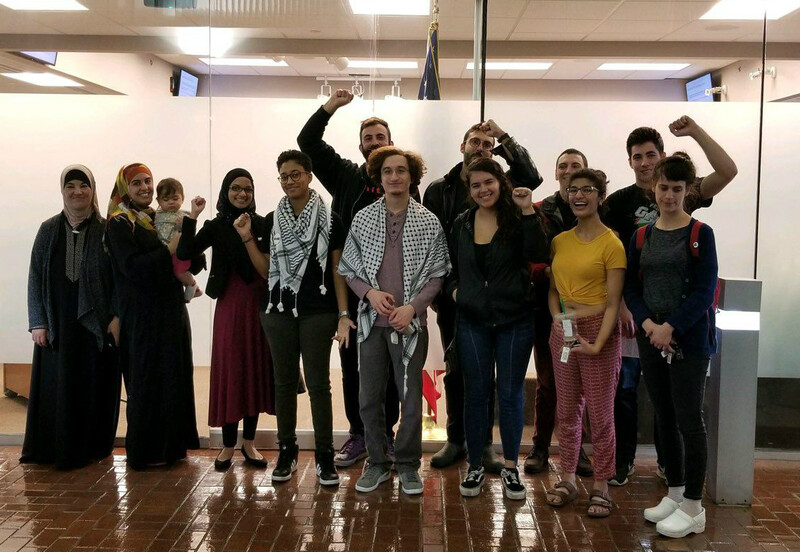Activism and BDS Beat 12 January 2018

Activists celebrate at New Orleans City Hall, 11 January. (New Orleans Palestinian Solidarity Committee)
On Thursday, the city of New Orleans, Louisiana, passed a resolution to start screening investments and contracts and divest from corporations that profit from human rights abuses.
New Orleans becomes the first major city in the US South to pass such a measure.
The resolution was drafted by members of the New Orleans Palestinian Solidarity Committee, which has organized protests and called on municipal leaders to declare New Orleans “an apartheid-free city” by banning financial ties to Israel, in accordance with the demands of the Palestinian-led boycott, divestment and sanctions (BDS) campaign.
“This overwhelming support is the product of only one thing,” Max Geller of the New Orleans Palestinian Solidarity Committee told The Electronic Intifada, “and that is consistent direct action and pressure.”
“No one on the city council went out of their way to help us here – we had to push them every step of the way,” Geller said.
Activists pointed out that US-based companies such as Caterpillar, which sells bulldozers the Israeli military weaponizes and uses to demolish Palestinian homes, and Hewlett Packard (HP), which is deeply invested in Israel’s military and security infrastructure, operate in New Orleans.
Campaigners made the connections between the ongoing displacement of people from New Orleans in the aftermath of Hurricane Katrina in 2005, and Israel’s displacement of Palestinians.
“New Orleans is a city that has a tragic history with human rights,” said Tabitha Mustafa of the New Orleans Palestinian Solidarity Committee. “Whether in Honduras or Palestine or Vietnam, companies that profit from the misery of New Orleanians and our families abroad should not do business with the City of New Orleans.”
Geller said the resolution “is an affirmation that the city feels bound by international human rights doctrine” and is willing to scrutinize its relationships with corporations that profit from abuses in the city and abroad.
As a new member of the New Orleans Palestinian Solidarity Committee, “it’s encouraging to see actual change and action taking place,” said Marco Saah, a student at Loyola University New Orleans.
It was inspiring to see that “my voice, and others’ voices were actually being listened to,” he told The Electronic Intifada.
Saah said that the key to passing this measure in the city council was “extreme persistence.”
“I’ve seen the amount of consistency, work and time that has been put into pressuring officials,” Saah said, and activists pursuing similar resolutions should “not be deterred.”
Making the case
The resolution doesn’t mention Israel or its abuses against Palestinians specifically, which Geller recognized is a point of frustration “because I want to organize around Palestine and I don’t think ending Israel’s human rights abuses is controversial.”
But he said that now activists have a platform to campaign specifically about companies that violate Palestinian rights and “the case against Caterpillar [and others] will be very easy.”
A similar resolution, passed last year in Portland, Oregon, drew criticism from local activists who cautioned against omitting Palestinian human rights from the text in order to ensure a wider coalition.
The wording of the New Orleans resolution “is purposely vague,” Geller explained, in order to get the issues on the table, but added that municipal BDS campaigns “are incremental processes.” He urged activists to keep pressure on local, state and federal lawmakers.
Pushing back
The resolution’s passage follows Israel’s announcement last week that it is banning entry to activists from 20 Palestine solidarity organizations around the world, a move reminiscent of South Africa’s apartheid regime.
Meanwhile, more than 20 states across the US have adopted measures aimed at chilling free speech and blacklisting advocates for Palestinian rights. There is also a bill pending in Congress – the Israel Anti-Boycott Act – that could impose large fines and long prison sentences on companies and their personnel if they are deemed to be complying with a boycott on Israel or its settlements called for by an international organization.
The New Orleans resolution gives activists the opportunity to take such legislation and threats head-on, Geller said. “We do see ourselves as the logical test case against them.”





